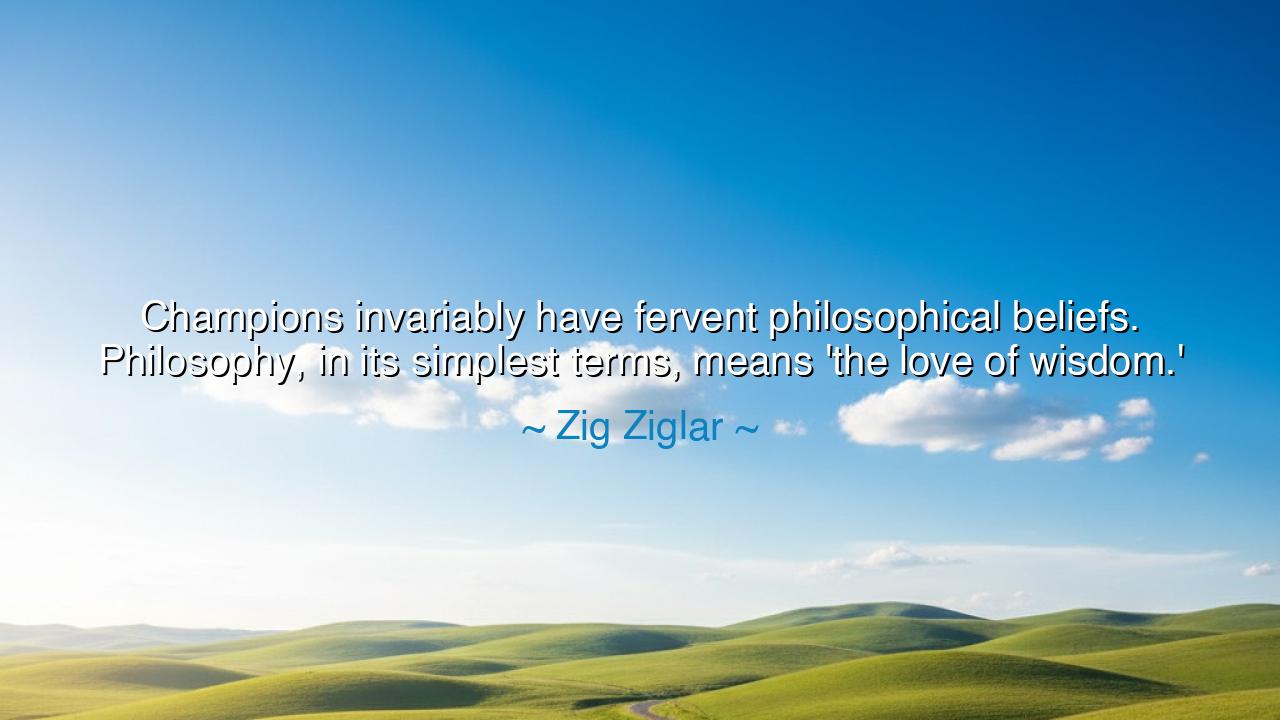
Champions invariably have fervent philosophical beliefs.
Champions invariably have fervent philosophical beliefs. Philosophy, in its simplest terms, means 'the love of wisdom.'






Hearken, O seekers of greatness, to the words of Zig Ziglar, who reveals a hidden truth behind the deeds of the champions among men. He teaches that those who achieve victory, whether in sport, intellect, or life itself, are guided not merely by skill, but by fervent philosophical beliefs. These beliefs, anchored in principles and reflection, provide strength, direction, and purpose, for philosophy, at its essence, is the love of wisdom. Here is a teaching for all generations: true triumph is born not of talent alone, but of the cultivation of the mind and the discernment of the heart.
The origin of this reflection emerges from Ziglar’s life as a mentor, speaker, and observer of human motivation. In his experience, he witnessed countless individuals striving for success, yet only those who embraced a coherent, principled worldview—who sought understanding beyond mere mechanics—rose to lasting excellence. Philosophy, he reminds us, is not an abstract pursuit, but a living guide, shaping choices, fostering resilience, and illuminating the path to achievement.
The meaning of this aphorism extends beyond athletics or commerce. It teaches that champions are defined by more than victory; they are defined by their capacity to integrate wisdom into action. To be guided by philosophical reflection is to align the will, the mind, and the spirit, transforming obstacles into lessons and challenges into opportunities. Here lies the ancient truth: triumph without wisdom is fleeting, but victory harmonized with insight endures.
History offers luminous examples. Consider Mahatma Gandhi, who achieved moral and political victories not through force alone, but through a steadfast devotion to principle, a philosophical belief in nonviolence, and a profound love of truth. His triumphs over oppression were inseparable from his cultivation of wisdom, illustrating Ziglar’s lesson that the heart of a champion beats in accordance with higher understanding and reflective purpose.
Moreover, this teaching resonates in the lives of all who aspire to greatness. Whether in the arts, sciences, or leadership, those who cultivate philosophical insight possess the fortitude to persevere, the clarity to discern right from expedience, and the humility to learn from failure. The love of wisdom becomes both compass and shield, ensuring that achievement is not hollow, but meaningful and enduring.
O generations yet unborn, take this counsel to heart: to pursue championship is to pursue more than skill or fame. Seek the guidance of philosophy, cherish the love of wisdom, and let your victories be shaped by reflection, principle, and insight. For it is in this union of action and understanding that the true champions arise, leaving a legacy not of fleeting glory, but of enduring truth and greatness.






GDGold D.dragon
Reading this, I think about how philosophy and success might intersect in daily life. Could the principles that guide champions—ethical reasoning, strategic thinking, self-reflection—be taught or cultivated systematically? I’m curious whether champions consciously study philosophical concepts, or if their love of wisdom manifests through habits, decision-making, and mentorship. Does this imply that cultivating a philosophical mindset is a crucial, yet often overlooked, component of achieving excellence in any field?
TTam
I feel this quote emphasizes the importance of inner values and reflection. Could the love of wisdom provide champions with clarity and perspective that helps them navigate challenges and maintain focus? I also wonder whether this is a universal trait among high achievers or something Ziglar observed subjectively. How do personal beliefs, ethical frameworks, and philosophical outlooks influence leadership and decision-making in competitive or high-pressure environments? This perspective encourages reflection on the role of mindset in long-term achievement.
TLNg Thuy Linh
This perspective makes me question the balance between theory and practice in achieving excellence. Are philosophical beliefs the driving force behind motivation, decision-making, and resilience, or are they complementary to technical mastery? I’m curious how champions identify and develop their personal philosophies. Does having a love of wisdom inherently make someone more adaptable and thoughtful under pressure? Could this suggest that cultivating philosophical reflection is as important as honing skills when preparing for high-stakes performance?
QN9/6-N6 34- Nguyen Thi Quynh Nhu-
I find this statement thought-provoking because it connects abstract philosophy to tangible achievement. Could the love of wisdom be what allows champions to learn from failure, adapt strategies, and maintain consistency under pressure? I’m curious whether this principle applies outside of traditional competitive arenas, such as entrepreneurship, social leadership, or academia. How do we cultivate fervent philosophical beliefs in ourselves or others, and what role does mentorship play in guiding champions toward both skill and ethical reflection?
BOKhum Be Oi
Reading this, I feel intrigued by the idea that champions possess fervent beliefs. Does this suggest that achieving excellence requires a framework of values or principles beyond raw skill? I wonder how much of this philosophy is consciously articulated versus instinctively lived. Could fostering a love of wisdom, reflection, and ethical grounding contribute not only to personal success but also to inspiring and leading others? This also raises questions about the role of mindset versus innate talent.